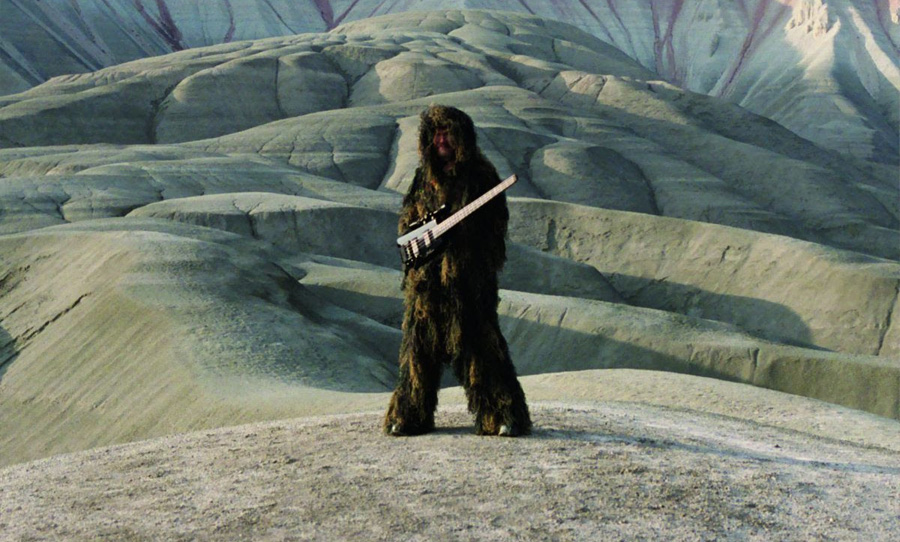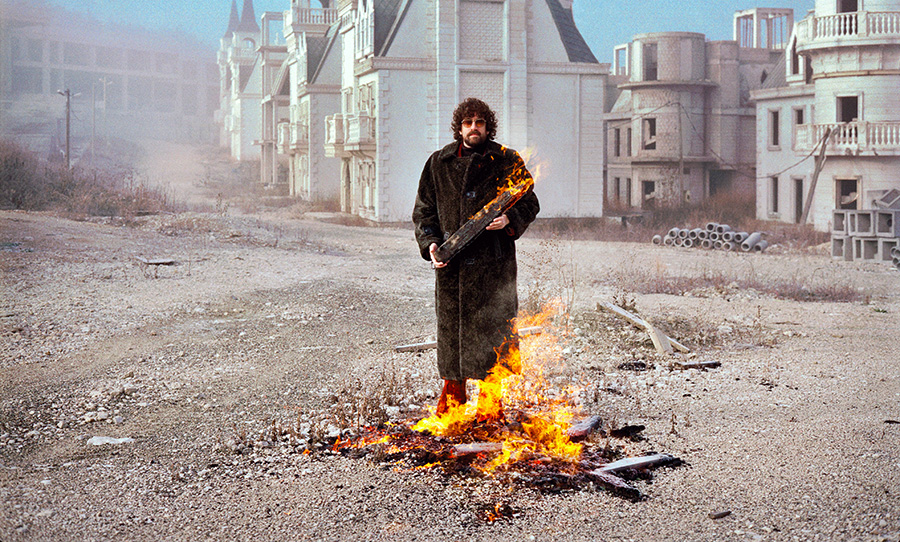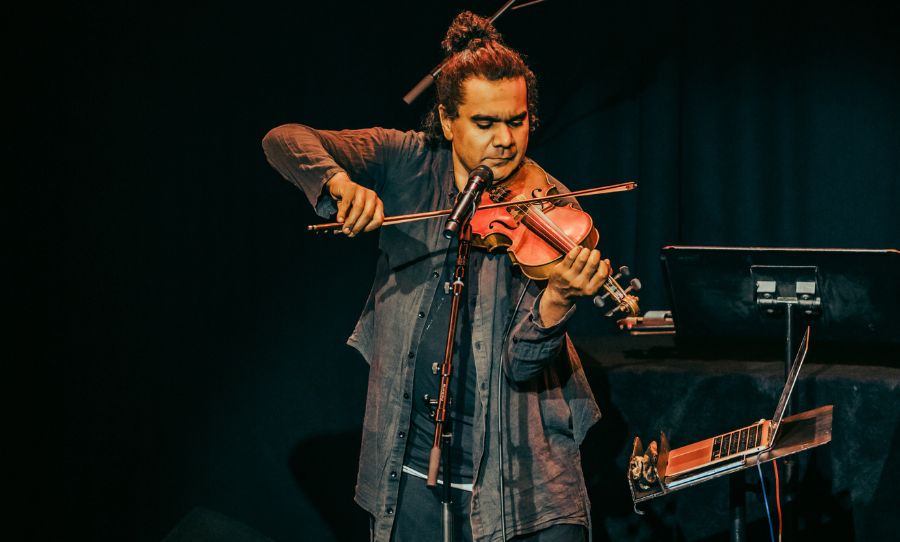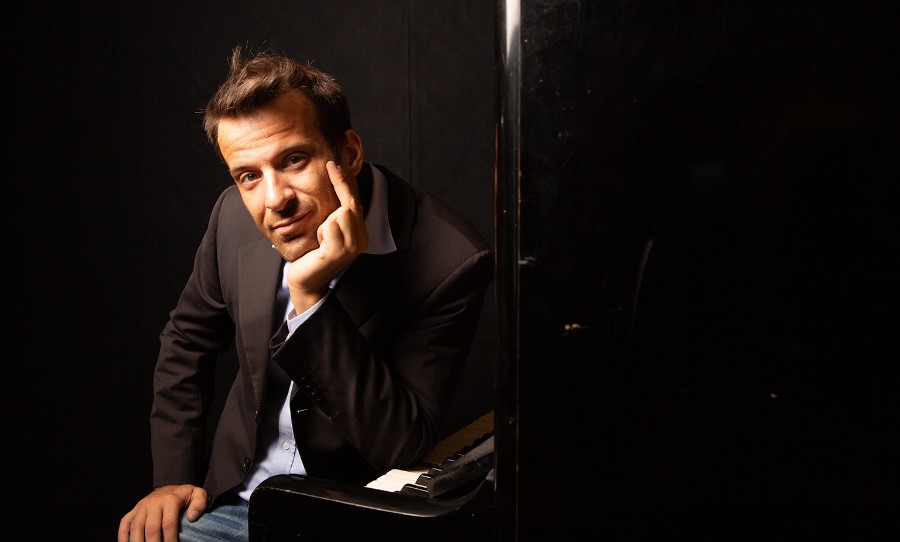As one half of Justice, Gaspard Augé is responsible for some of history’s most supercharged dance music. With his debut album Escapades, Augé adjusts his vision.
Gaspard Augé, alongside Xavier de Rosnay, is one of biggest names in dance music. As Justice they sold many millions of records, created timeless hits such as Genesis or D.A.N.C.E., and twisted French dance music in a distorted new direction when it seemed like nobody could break out from the immense shadow of Daft Punk.
But Augé isn’t just someone who creates hits that move heaving, 20,000-person dance floors. He’s a tragic for classical music, literature, and film, a devotee of the arts in a way that only the French seem to pull off. This love for the old world of composition and the “musical language” it spoke with – less four chords, more four movements – has led him to his debut album Escapades.
With Escapades, Augé’s maximalist approach to music making has found a perfect fusion with these influences – from disco, to prog rock, to soundtracks of the 1960s’ greatest masters of cinema – a cocktail that burns the ears like a perfectly portioned sprinkle of chilli.
We spoke to Augé earlier this week to dive into it all, from how he named certain tracks on Escapades after towns or characters, to why creating this album felt like cheating on his partner.

HAPPY: When I listened to the album for the first time, I noticed the music feels very visual. You’re a designer, too, so I wanted to ask: do you find yourself subconsciously creating visual worlds for your songs to live in?
GASPARD: Yeah, I guess I wanted to propose something as open as possible, you know, in terms of our visuals, because it’s instrumental music. So there’s no lyrical content or storytelling. And what I like about instrumental music is that depending on your own life story or your musical background, you can put whatever you like on the music. I guess it’s a more stimulating practice for me, just for my imagination. This is what it means, ‘imagination’, you know, it’s creating images in your head. That’s the angle.
HAPPY: And some of the tracks are named after real places. What is it about a certain place that captures you enough to write a song after it?
GASPARD: Most of the time, it was the other way around. Like, for example, Casablanca, when I wrote it, afterwards, I felt it had some kind of Arabian Nights feeling. And so I named it Casablanca because I always liked the name and my mom was born there, so I chose the name afterwards. And the one called Europa, it’s more about this feeling of really European influences – mostly I like to refer to Europe as ‘the old continent’, with this DNA of classical music, and composers, and everything.
HAPPY: Does the fact that we’re not all allowed to go anywhere or travel, has that impacted this whole idea of going somewhere in your imagination?
GASPARD: Actually, it is something I didn’t think about when I first started working on the record, because the record has been finished like almost a year and a half ago. But I guess it probably influenced the concept of the videos and also the need to have something very enticing. Because for me it’s a welcoming record and it has some some universal qualities, I guess, so there is a lot of symbolism and stuff in the videos, but it’s definitely about traveling without moving because we can’t go anywhere else. So you have to make the extra effort to just travel in your own head.
HAPPY: One particular reference: Rocambole. Is that named after the character created by Pierre Alexis Ponson du Terrail?.
GASPARD: Yeah. It’s fun because like the adjective ‘rocambolesque’ comes from this guy. And as you say, it’s kind of pleasurable to say it, and the adjective now means something – it’s all about having a crazy adventure, like with lots of accidents and stuff. It just fits in the track because it’s always evolving in a surprising way.
I was really attached to also giving [songs] French names, or these names that would be easy for non-French speaking people to understand and to get inspired by. And also, they are very simple titles and it’s always just one word, mostly because it’s easier for people to make their own assumptions about it. It’s the same with the videos, you know, it’s one minute long and then the viewer has to make up what happened before and what’s going to happen next. It’s more fun like that.
HAPPY: All these reference that you seem to fit into the album – is that something that you look forward to to hearing people find out about and talk about online? Do you get any enjoyment out of seeing people sort of dig into all of that stuff?
GASPARD: Your example, Rocambole has a meaning that fits the track, but it derives from the working title that was Rocko. I don’t know why I called it Rocko, because, you know, it’s always a bit silly with working titles. And then you find something that is kind of similar, but there is a better and better sounding word or better meaning. But also, it is just more enjoyable for everybody to have these kind of titles with meaning.
HAPPY: So you like to provide a canvas, but maybe never give anyone the full picture?
GASPARD: No, and especially for instrumental music. It’s so subjective and I guess for me, the main concern was to never be too abstract or too experimental. You know, it’s always about melodies and some things you can sing along to. And I hope that it’s adventurous at some moments. But it’s more just about the music itself and the emotion that you can experience when you’re listening to instrumental music. Because I don’t know much about classical music, but to me, it’s definitely the most evocative music ever, you know? The funny thing is that probably most people think they don’t know anything about classical music, but through movies or commercials and everything they probably know, like, 200 pieces of classical music without knowing it.
HAPPY: Definitely.
GASPARD: And as a result, it’s used, because it’s so powerful.
HAPPY: Was that classical influence as important to you during your time with Justice? Because after listening to this Escapades, I can definitely go back and hear it on songs like Genesis, or Planisphere.
GASPARD: Yeah. We’ve always been fascinated with baroque music, because when you think about it, it’s not so far from… heavy metal is not that far from classical music in the form, because it’s very technical, and you have loads and loads of notes and you have this kind of epic feel to it. And I guess this is something we’ve always liked. But also, I really feel that the musical language got poorer and poorer, you know? Because today, in most music, like it’s always the same four chords put in a different order. And to me, it just feels like… the musical panel of emotions shrunk, you know, we kind of lost something in the process, just like that! The panel of chords you have limits like the panel of emotions you can experience, you know what I mean?
HAPPY: Yeah, absolutely. I think, in lots of ways, modern electronic music is doing a lot of the same things that classical music always was able to do. When I looked at some of my favourite composers, they’re people who’ve had a bit of a career in pop music and then moved over to things like soundtracks, like Ryuichi Sakamoto, or Giorgio Moroder, or M83. Do you think that modern electronic music can do all those things, emotionally, that soundtracks or classical music can?
GASPARD: Obviously I like the sound, and the modern textures are definitely bringing something to the table. But it’s maybe… for example, when you think like Kubrick, he always used classical music, and I guess it was for a reason, just because it’s hard to beat. You know, and obviously, he was a progressive to work with Wendy Carlos and take classical music to another level. I guess it’s just the thing that works best with images, at least for me.
Obviously today, you have really, really amazing composers that are more into… maybe it’s a bit more ambient than what it was before. And maybe the directors might find that when you have too many notes, you know, it gets a bit corny, and that was definitely not a concern in the ’60s and ’70s. The process of making a soundtrack that I really liked from this era is when you have a stronger melodic theme, and then you just like deconstruct it in certain ways, like research different arrangements, different modes, and everything. It’s really fun to make sure you twist the melody to give like different moods and emotions.
HAPPY. Is doing a soundtrack something that you’d be interested in? I know you did the Mr. Oizo soundtrack, but…
GASPARD: I mean yeah, it could be fun. But the Mr. Oizo soundtrack, it was really made in a hurry. So it’s not very refined, but just because this is the way like Oizo works, he really loves to keep the energy of the first draft and to never get tired of something. So, we did do this one very quickly. But it’s also fun to do things fast and not overthink everything. I guess I would love to do soundtracks, but it always depends on the movie.
And weirdly enough, my favourite movies, they don’t have much music in it, just because they’re… sometimes it feels a bit like some kind of emotional rape in a way, you know? Like the director wants you to be sad, so he puts like a lot of sad violins, and then you’re sad. And when he wants you to be excited, he puts a lot of percussions and drones and… I mean sometimes it’s really well-made, but sometimes, when the tricks are too obvious, it’s taking me out of the movie.
HAPPY: Yeah, it’s a different experience. Most people compose a soundtrack to a locked edit as well, which is obviously very, very different to creating an album.
GASPARD: Yeah, yeah, yeah. I guess I’m still attached to the experiments of old school, obviously. Because nobody listens to a full album these days. I mean, most people don’t. Everybody, even myself, picks his favourite track and then gets rid of the album as something coherent. I guess I still like the idea of having a beginning, and some kind of pièce de résistance, you know?
HAPPY: Now just as a last thing, I couldn’t resist asking about this. You said that going solo felt a bit like cheating on your partner. So, were you nervous at all to hear Xavier’s thoughts on the record?
GASPARD: No, I mean, it was liberating, Not necessarily to be doing something without Xavier, but just to get out of the general dynamics of a duo. Obviously we are an older couple – it’s been 20 years that we’ve been making music together. It’s more about just the principle, because Justice is very democratic – when one of us doesn’t like something, we just scrap it. There’s always some level of compromise. And I guess it’s just good to move on and try new things and work with other people. It’s always good to get out of your comfort zone.
HAPPY: Now you’re the boss.
GASPARD: [Laughs]
Escapades is out now via Ed Banger Records / Because Music / Virgin Music Australia. Stream or buy your copy here.



